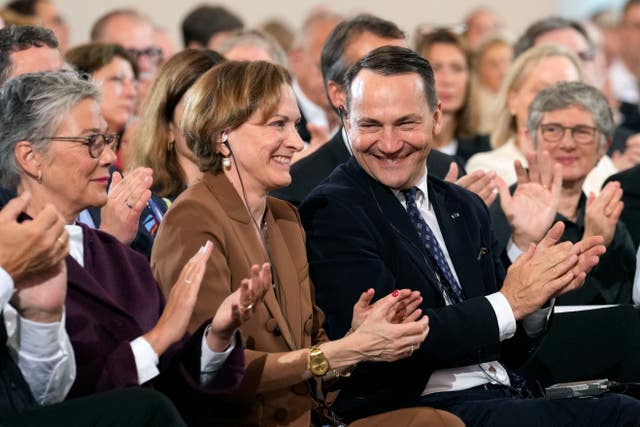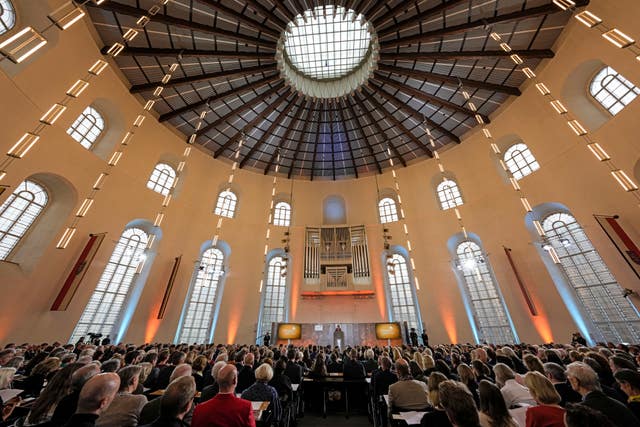
The prominent American journalist and historian Anne Applebaum urged continued support for Ukraine as she accepted a prestigious German prize on Sunday, saying pacifism in the face of aggression is often nothing more than appeasement.
She made her appeal to an audience in Frankfurt, where she was awarded the Peace Prize of the German Book Trade.
She was joined by her husband, Polish foreign minister Radek Sikorski, who like his wife is a strong voice on the international stage for supporting Ukraine as it defends itself against Russia’s invasion.
“If there is even a small chance that military defeat could help end this horrific cult of violence in Russia, just as military defeat once brought an end to the cult of violence in Germany, we should take it,” Ms Applebaum said.
Many Germans have embraced an ethos of pacifism as a result of their nation’s aggression under Adolf Hitler during the Second World War.

Many have misgivings now about supplying weapons to Kyiv, fearing Russia and worried that it could cause the war to spread beyond Ukraine’s borders to the rest of Europe.
“Some even call for peace by referring solemnly to the ‘lessons of German history’,” Ms Applebaum said, according to a transcript of her speech published by the prize organisation.
“As I am here today accepting a peace prize, this seems the right moment to point out that ‘I want peace’ is not always a moral argument,” she said.
“This is also the right moment to say that the lesson of German history is not that Germans should be pacifists.”
“On the contrary, we have known for nearly a century that a demand for pacifism in the face of an aggressive, advancing dictatorship can simply represent the appeasement and acceptance of that dictatorship.”
She said the “real lesson” from German history should be that Germans “have a special responsibility to stand up for freedom and to take risks in doing so”.
The prize, which is endowed with 25,000 euros (£21,000), was awarded in St Paul’s Church in Frankfurt, which is considered the birthplace of German parliamentary democracy, at the end of the Frankfurt Book Fair.

The prize has been awarded since 1950. It honours individuals who have contributed to turning the idea of peace into reality through literature, science or art.
Last year’s prize was awarded to British-Indian writer Sir Salman Rushdie for his perseverance despite enduring decades of threats and violence.
The German news agency dpa reported that Applebaum’s strong support for continuing to arm Ukraine triggered some criticism, citing Karin Schmidt-Friderichs, the head of the German Publishers and Booksellers Association, which awards the prize.
Nonetheless she received strong applause for her speech, dpa reported from Frankfurt.
Following pacifism to its logical conclusion, Applebaum argued, would “mean that we should acquiesce to the military conquest of Ukraine, to the cultural destruction of Ukraine, to the construction of concentration camps in Ukraine, to the kidnapping of children in Ukraine”.
Ms Applebaum writes for The Atlantic magazine. She has written books that focus on totalitarianism in eastern Europe, including The Gulag and The Iron Curtain and Red Famine, about dictator Joseph Stalin’s war on Ukraine.
She recently published Autocracy, Inc. The Dictators Who Want to Run the World. In 2004, she was awarded the prestigious Pulitzer Prize.
The prize jury said Ms Applebaum’s analyses of communist and post-communist systems in the Soviet Union and Russia reveal “the mechanisms by which authoritarians grab hold of power and maintain their control”.
The commendation for Applebaum was delivered by the Russian historian Irina Scherbakova, a founding member of the human rights organisation Memorial, which is now banned in Russia and was awarded the Nobel Peace Prize in 2022.


Comments: Our rules
We want our comments to be a lively and valuable part of our community - a place where readers can debate and engage with the most important local issues. The ability to comment on our stories is a privilege, not a right, however, and that privilege may be withdrawn if it is abused or misused.
Please report any comments that break our rules.
Read the rules hereLast Updated:
Report this comment Cancel